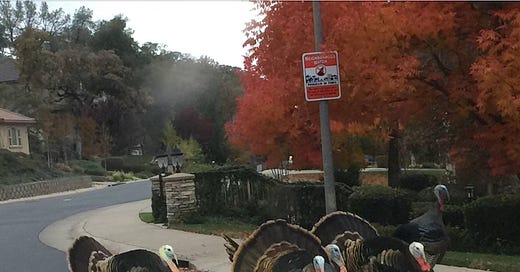Happy Turkey Day! A Celebration of the Marvelous Turkey
Let’s Celebrate the Turkeys, Not the Table
Thanksgiving is upon us, and while many associate this holiday with feasts and family gatherings, let’s take a moment to celebrate the true star of the season: the turkey—not as a meal, but as a marvel of nature! These remarkable birds are more than just a holiday icon; they’re intelligent, emotionally complex, and deeply rooted in history and culture. So, let’s gobble up some fascinating facts about turkeys and honor their place in our world.
The Science of Turkeys: Brainy Birds with Big Hearts
Contrary to popular belief, turkeys are far from simple-minded. Wild turkeys (Meleagris gallopavo), in particular, boast impressive cognitive abilities:
Spatial Memory: Turkeys can recognize over 1,000 acres of terrain, making them exceptional navigators in their natural habitats.
Social Skills: Turkeys form intricate social hierarchies and lasting friendships within their flocks. They even exhibit affection toward humans who treat them kindly.
Vocal Communication: With more than 20 distinct vocalizations, turkeys have a sophisticated "language" that allows them to recognize individual voices within their group.
These traits reveal a bird that thrives in complex social and environmental landscapes, challenging the stereotype of turkeys as mere barnyard fowl.
Turkeys in Native American Culture: Revered and Respected
Long before turkeys became synonymous with Thanksgiving, they held profound spiritual and cultural significance for Indigenous peoples across the Americas. Archaeological evidence shows that ancient Native American communities revered turkeys for their feathers, symbolic meanings, and practical uses:
Spiritual Roles: The Cherokee have a myth where a turkey helped humans discover corn as an edible crop. In Aztec mythology, Chalchiuhtotolin—the "jade turkey"—was a deity associated with disease and purification.
Feathers as Symbols: Turkey feathers were prized for their representation of rain and fertility. Pueblo peoples used them to create blankets, while tribes like the Wampanoag crafted cloaks from them.
Ceremonial Burials: Archaeologists have uncovered sites where turkeys were ceremonially buried, often linked to fertility rites or crop planting rituals.
In these traditions, turkeys were seen not just as animals but as beings intertwined with the cycles of life and nature.
The Secret Lives of Turkeys: A Peek into Their World
Turkeys lead fascinating lives filled with drama, strategy, and even teamwork:
Dominance Hierarchies: Both male and female turkeys navigate complex social structures. Males compete for dominance during mating season, with top-ranking males securing prime opportunities to court hens.
Brotherly Bonds: Male turkeys sometimes form alliances with their brothers. One acts as a "wingman," helping the dominant sibling attract mates—a behavior rooted in evolutionary kin selection.
Parenting Prowess: Female turkeys (hens) are devoted mothers who carefully guard their broods of poults (baby turkeys), teaching them survival skills from an early age.
These behaviors showcase the depth of turkey society—a dynamic world filled with cooperation and competition.
Turkeys Through Time: From Ancient Domestication to Global Icon
The domestication of turkeys dates back thousands of years to Mesoamerican cultures like the Maya and Aztecs. These civilizations valued turkeys not for food but for their feathers and symbolic importance. By the time Spanish explorers arrived in the Americas in the 1500s, domesticated turkeys were already integral to Indigenous life.
Interestingly, when European settlers brought domesticated turkeys back across the Atlantic, these birds quickly gained popularity. By the 16th century, they were being farmed throughout Europe under names like "Indian chicken," reflecting their exotic origins. Today’s domestic turkey descends from these early Mesoamerican stocks.
A Call for Compassion: Honoring Turkeys This Thanksgiving
As we celebrate Thanksgiving—or Turkey Day—let’s take a moment to appreciate these extraordinary birds beyond their role on our plates:
Consider learning more about wild turkeys and their habitats.
Support wildlife conservation efforts that protect these birds.
Explore plant-based alternatives for your Thanksgiving feast to honor turkeys as living beings.
Turkeys are not just symbols of abundance; they are sentient creatures with rich histories and vibrant lives. This Thanksgiving, let’s celebrate them for who they are—intelligent, emotional, and deeply connected to our shared heritage.
So here’s wishing you a Happy Turkey Day filled with gratitude, wonder, and maybe even a newfound respect for our feathered friends!
Ed Boks is a former Executive Director of the New York City, Los Angeles, and Maricopa County Animal Care & Control Departments, and a former Board Director of the National Animal Control Association. His work has been published in the LA Times, New York Times, Newsweek, Real Clear Policy, Sentient Media, and now on Animal Politics with Ed Boks.






Thanks!!! Calling some people turkeys should mean Congrats!!!